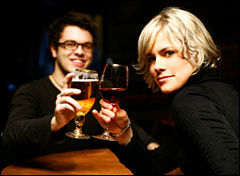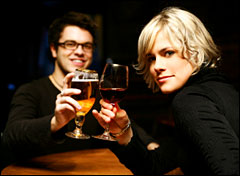Hi Umbra,
Due to, among other things, (organic) beer, I ended up in a rather heated discussion on the environment the other day. I’m wondering if you could help clear up a couple of these more or less classic micro-level questions. Which is more environmentally friendly: lighting a cigarette with a match or a lighter? (And how bad is smoking from an environmental point of view anyway?) After hand wash: paper towel or air dryer? Paper cup of coffee or good old ceramics? Wine or beer?
Kjetil M.
Oslo, Norway
Dearest Kjetil,
Organic beer: so pure it makes drinkers forget about sports and think about the environment. I’ve addressed all but one of these questions before. You can find answers to these and other micro-questions in my FAQ. Yes ceramic cup! Go hand dryer! Smoking is indefensible from an environmental angle, so I don’t see any point in debating over how to light a cigarette. Here’s my heartless anti-smoking rant, and some additional lovely factoids from Treehugger.

Whatever you drink, be smart.
So. The remaining, untouched question is wine versus beer. To be fair to cigarettes, alcohol is also a poisonous drug that will maim and kill if used too often. Laying off the sauce will certainly benefit both your carbon foot and your liver. Ask Umbra: the column devoted to fun things we shouldn’t do!
First, some general thoughts. Of the ways to reduce your wine/beer consumption footprint, the main one is not a big surprise: Don’t drive to drink. Other broad guidelines include: buy local, buy in lighter containers, and buy in bulk. The romantic French habit of buying a local barrel of wine and having it bottled in your basement (do they still do this or is it just in pre-War memoirs?) is a great way to go.
Now, as to whether wine or beer wins. A 2007 study called “Red, White, and Green” considered the production and transport of wine. Although cultivation techniques such as organic vs. conventional do have an impact, the main consideration is that glass bottles are heavy and wine often travels far. Typical greenhouse gas emissions for wine, according to this study, were 2 kg per liter. Consumers can help reduce this by buying wine made near to home, investigating lighter box wines, and of course making their own wine. (Interestingly, there is a side note in the study indicating that your Norwegian alcohol monopoly, Vinmonopolet, buys wine in bulk and bottles it in Norway.)
For wine, the size of the container and the method/distance of transport are the big variables. Various studies of beer, on the other hand — some undertaken by brewers — show that refrigeration in open coolers at stores is a big factor. New Belgium Brewing found that retail storage accounted for over a quarter of the carbon footprint for their amber ale; producing the glass and transporting it to the plant was next. They calculated total carbon emissions at 3.19 kg per six-pack. Sapporo has started labeling beer cans with carbon footprints; their estimate is that a 350 ml can of Black Label beer emits 161 g of carbon. Consumers can help by drinking local brews, shopping for unrefrigerated beer, brewing their own beer, and taking large containers of beer home from the local brewery.
All these numbers are interesting, but fairly inconclusive. This is because the footprints of different kinds of wine and beer vary significantly. In part this is because all Life Cycle Analyses are not identical, but it is also due to the plain old variations in how raw materials are grown, how a product is produced, how it is packaged, how far it had to come to you, etc.
You will notice, I hope, that the emissions for a bottle of wine or a six-pack of beer are quite small compared to the most important factor: how you obtain the beverage. A gallon of gasoline emits 8.8 kg of carbon. For you as a consumer of beer and wine, the biggest factor is likely your own transport to the beer or wine. Coincidentally, it’s not wise to drive under the influence of alcohol. I leave the obvious conclusion up to you.
Skålly,
Umbra


